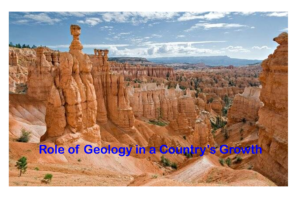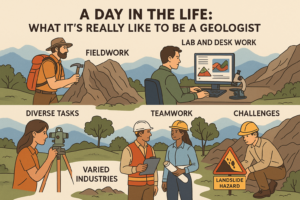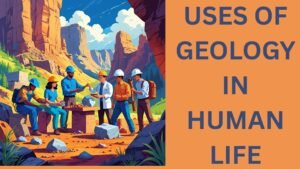When we think about a country’s development, our minds often drift to technology, infrastructure, education, or economic policies. But there’s a quieter, deeper contributor that often goes unnoticed—geology. Hidden beneath our feet, the Earth’s layers hold not just rocks and minerals but the very foundation for economic progress, resource security, environmental planning, and sustainable development.
In this article, we’ll explore how the geological study of Earth’s structure, materials, and processes plays a vital role in shaping the growth of any nation. From powering industries to informing urban planning and protecting communities, geology is a silent driver of progress.
Minerals and Energy Resources
At the heart of every industrial economy lies a demand for natural resources such as coal, oil, gas, metals, and rare earth elements. These resources don’t just appear magically; they are found, studied, and extracted through the work of geologists.

Mining and Minerals
Mineral resources form the backbone of a country’s manufacturing and construction industries. Iron, copper, bauxite, limestone, and phosphates are essential for producing everything from steel to fertilizers. Geologists help locate economically viable deposits, assess their quality, and determine the best methods for extraction while minimizing environmental damage.
Countries like Australia, Chile, South Africa, and India have developed robust mining sectors largely due to their geological wealth. These sectors contribute billions to the national GDP, create employment, and support downstream industries.
Energy Security
Geologists play a key role in locating fossil fuels such as coal, petroleum, and natural gas. They analyze sedimentary basins, model subsurface formations, and interpret seismic data to guide drilling operations. Even in the age of renewables, fossil fuels remain a critical part of energy infrastructure in many countries.
Moreover, geology is also central to clean energy, including the sourcing of lithium, cobalt, and rare earth elements used in batteries, wind turbines, and solar panels.
Infrastructure and Urban Development
Building a city isn’t just about blueprints and budgets, it’s also about understanding the ground it stands on. Before any bridge, road, dam, or skyscraper is built, geologists are called in to assess the site.
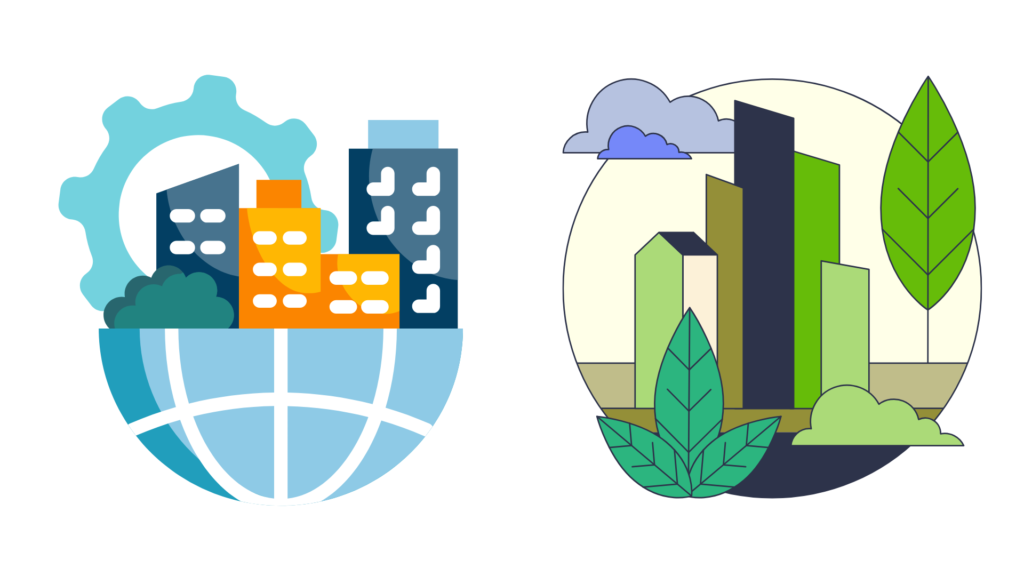
Engineering Geology
Geologists evaluate soil strength, rock stability, and groundwater conditions to ensure that buildings won’t sink, shift, or collapse. This is especially important in earthquake-prone or landslide-susceptible regions. For example, the design of dams like Tehri in India or Hoover Dam in the U.S. required extensive geological analysis before construction.
Disaster Resilience
Proper geological knowledge can help governments design cities that are resilient to natural disasters like earthquakes, floods, and landslides. Urban planning that incorporates geological risks leads to safer, longer-lasting infrastructure and minimizes post-disaster economic loss.
Agriculture and Water Management
A country cannot grow without food and water. Geology contributes directly to both through soil formation, groundwater exploration, and land management.
Soil and Fertility
Soil is a product of weathered rock. Understanding the mineral composition of the underlying geology helps determine soil fertility and its suitability for different crops. Agricultural planning based on geologic maps can improve yield and sustainability.
Water Resources
Groundwater is a lifeline in both arid and agricultural regions. Hydrogeologists study aquifers, groundwater recharge zones, and contamination risks. This information is essential for designing irrigation systems, ensuring drinking water supply, and managing water conflicts between regions.
In regions like Rajasthan in India or the Sahel in Africa, geological surveys have helped locate deep aquifers that support millions of people.
Environmental Protection and Climate Resilience
Geology isn’t just about extraction, it also plays a critical role in protecting ecosystems and preparing for the future.
Natural Hazard Assessment
Earthquakes, tsunamis, landslides, and volcanic eruptions can wipe out decades of development in minutes. Geologists monitor these hazards, develop early warning systems, and inform policies that reduce vulnerability.
For example, after the 2004 tsunami, geological studies helped re-map coastlines and build better coastal defenses. Similarly, landslide zonation maps help local governments in hill areas like the Himalayas or Andes plan safer settlements.
Climate and Carbon Storage
Geological formations such as sedimentary basins can store carbon dioxide as part of carbon capture and storage (CCS) strategies, a key tool in mitigating climate change. Understanding glacial geology also helps in predicting sea level rise and its impact on coastal areas.
Education, Employment, and Scientific Innovation
Geology contributes not just to physical infrastructure but also to the human capital of a nation.
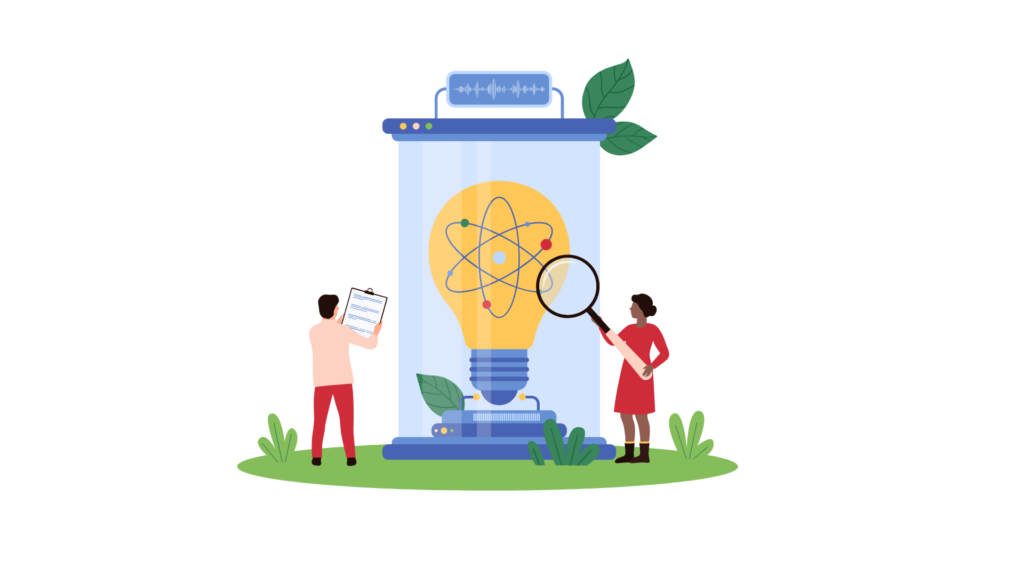
Academic and Research Contributions
Geological research enhances our understanding of Earth’s past, which in turn informs how we respond to future challenges. Universities, research institutes, and geological surveys train scientists and inform government policy with cutting-edge studies on earthquakes, tectonics, paleoclimate, and resource management.
Employment Generation
The geology sector supports jobs in:
- Mining and exploration
- Environmental consulting
- Infrastructure development
- Water resource management
- Natural hazard mitigation
In developing countries, expanding geological services also boosts local economies and builds skilled workforces.
National Security and Strategic Resources
In the 21st century, geology has entered the sphere of national security. Critical minerals like lithium, rare earth elements, and cobalt are essential for defense technologies, communication systems, and energy independence.
Countries are racing to secure their own supplies of these strategic minerals to reduce dependency on imports. Geologists are leading this charge through surveys and assessments of domestic potential.
The Geological Survey of India, USGS, and similar organizations globally are actively mapping and prioritizing deposits of strategic value.
FAQs on Role of Geology in a Country’s Growth
How does geology contribute to national economic development?
Geology plays a key role in a nation’s economic development by helping locate and manage natural resources such as minerals, fuels, and groundwater. These resources are essential for industries, infrastructure, and energy production, forming the backbone of economic growth.
What is the role of geology in infrastructure development?
Geological surveys and studies guide the construction of roads, dams, tunnels, and buildings by providing information about rock strength, soil stability, and seismic activity, ensuring safe and cost-effective infrastructure planning.
How does geology support sustainable resource management?
Geology provides knowledge about the distribution and extraction limits of resources, helping policymakers implement sustainable mining, groundwater use, and land development practices while minimizing environmental damage.
How is geology important for energy security?
Geologists explore and assess reserves of fossil fuels like coal, oil, and natural gas, as well as renewable energy sources like geothermal. This ensures a reliable energy supply for domestic use and industrial needs, reducing dependence on imports.
What role does geology play in agriculture?
By analyzing soil composition, erosion patterns, and groundwater availability, geology helps optimize agricultural practices. This supports food security and the efficient use of fertilizers and irrigation.
Can geology help reduce natural disaster risks?
Yes, geological studies are crucial in identifying earthquake-prone zones, landslide risks, and flood-prone areas. Early warnings and proper land-use planning based on geological data can save lives and reduce economic loss.
How does geology assist in water resource management?
Groundwater exploration, aquifer mapping, and recharge area identification rely on geology. This helps ensure long-term availability of clean water for drinking, farming, and industry.
Why is geology important for environmental protection?
Geologists assess the impact of mining, waste disposal, and pollution on land and water systems. Their insights guide environmental regulations and remediation efforts to preserve natural ecosystems.
What is the role of geology in mining and mineral exploration?
Geology helps identify economically viable mineral deposits through detailed mapping, sampling, and geophysical surveys. This attracts investment and supports industrial and technological development.
How does geology contribute to climate change studies?
Through the study of past climate records in rocks, ice cores, and sediments, geology provides evidence of historical climate change, helping predict future patterns and informing adaptation strategies.
Is geology relevant in urban planning?
Yes, geology is essential in determining the suitability of land for urban expansion, preventing construction on unstable soils, floodplains, or active fault zones, and ensuring public safety.
How does geology influence tourism and heritage conservation?
Geological formations like caves, waterfalls, and canyons attract tourists and contribute to local economies. Additionally, geologists help preserve geologically significant sites for educational and cultural value.
Can geology contribute to employment and skill development?
Geology-related industries such as mining, petroleum, environmental consulting, and construction generate employment and demand skilled professionals, contributing to human resource development.
What is the importance of geological mapping for a country?
Geological maps are foundational tools for exploration, land-use planning, disaster management, and infrastructure development, enabling informed decisions across multiple sectors.
How does geology help in national defense and strategic planning?
Geological knowledge aids in the selection of defense infrastructure locations, tunneling, and access to strategic minerals essential for defense technology and national security.

